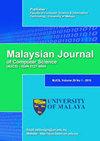利用深度学习技术检测社交媒体上伊斯兰问题的虚假信息
IF 1.2
4区 计算机科学
Q4 COMPUTER SCIENCE, ARTIFICIAL INTELLIGENCE
引用次数: 0
摘要
如今,许多人从社交媒体网络上收到关于他们周围发生的事情的新闻和信息。这些社交媒体平台是免费的,允许任何人在没有任何限制或验证的情况下发布新闻或信息或表达自己的意见,从而助长虚假信息的传播。最近,有关伊斯兰教的虚假信息通过社交媒体上专门攻击伊斯兰宗教的页面和群组传播开来。许多研究为在政治、社会、经济和医学等许多领域检测假新闻或误导性信息提供了模型,但伊斯兰领域除外。由于传播针对伊斯兰宗教的虚假信息的负面影响,伊斯兰恐惧症加剧,威胁到社会和平。在本文中,我们提出了一个基于双向长短期记忆的模型,该模型是在伊斯兰数据集(RIDI)上训练的,该数据集由两个独立的专门小组收集和标记。此外,使用预先训练的单词嵌入模型将生成词汇外,因为它涉及特定的领域。为了解决这个问题,我们使用Mittens方法对伊斯兰文件上预先训练的Glove模型进行了再培训。实验结果证明,与单向模型相比,我们提出的基于双向长短期记忆和伊斯兰文章再训练手套模型的模型在处理文本序列方面更有效,并且与其他模型相比,提供了95.42%的ROC曲线下面积测量的检测准确率。本文章由计算机程序翻译,如有差异,请以英文原文为准。
DISINFORMATION DETECTION ABOUT ISLAMIC ISSUES ON SOCIAL MEDIA USING DEEP LEARNING TECHNIQUES
Nowadays, many people receive news and information about what is happening around them from social media networks. These social media platforms are available free of charge and allow anyone to post news or information or express their opinion without any restrictions or verification, thus contributing to the dissemination of disinformation. Recently, disinformation about Islam has spread through pages and groups on social media dedicated to attacking the Islamic religion. Many studies have provided models for detecting fake news or misleading information in many domains, such as political, social, economic, and medical, except in the Islamic domain. Due to this negative impact of spreading disinformation targeting the Islamic religion, there is an increase in Islamophobia, which threatens societal peace. In this paper, we present a Bidirectional Long Short-Term Memory-based model trained on an Islamic dataset (RIDI) that was collected and labeled by two separate specialized groups. In addition, using a pre-trained word-embedding model will generate Out-Of-Vocabulary, because it deals with a specific domain. To address this issue, we have retrained the pre-trained Glove model on Islamic documents using the Mittens method. The results of the experiments proved that our proposed model based on Bidirectional Long Short-Term Memory with the retrained Glove model on the Islamic articles is efficient in dealing with text sequences better than unidirectional models and provides a detection accuracy of 95.42% of Area under the ROC Curve measure compared to the other models.
求助全文
通过发布文献求助,成功后即可免费获取论文全文。
去求助
来源期刊

Malaysian Journal of Computer Science
COMPUTER SCIENCE, ARTIFICIAL INTELLIGENCE-COMPUTER SCIENCE, THEORY & METHODS
CiteScore
2.20
自引率
33.30%
发文量
35
审稿时长
7.5 months
期刊介绍:
The Malaysian Journal of Computer Science (ISSN 0127-9084) is published four times a year in January, April, July and October by the Faculty of Computer Science and Information Technology, University of Malaya, since 1985. Over the years, the journal has gained popularity and the number of paper submissions has increased steadily. The rigorous reviews from the referees have helped in ensuring that the high standard of the journal is maintained. The objectives are to promote exchange of information and knowledge in research work, new inventions/developments of Computer Science and on the use of Information Technology towards the structuring of an information-rich society and to assist the academic staff from local and foreign universities, business and industrial sectors, government departments and academic institutions on publishing research results and studies in Computer Science and Information Technology through a scholarly publication. The journal is being indexed and abstracted by Clarivate Analytics'' Web of Science and Elsevier''s Scopus
 求助内容:
求助内容: 应助结果提醒方式:
应助结果提醒方式:


